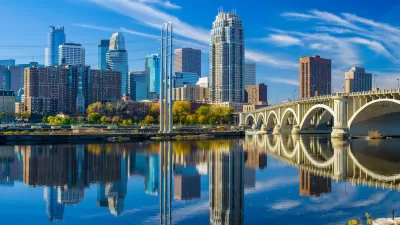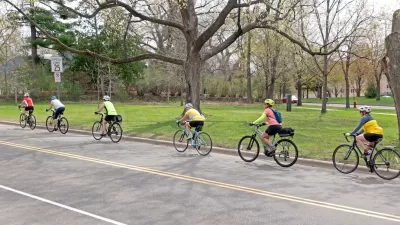We Americans love a discount. Wal-Mart and the discount retail boom are proof enough of that. What we love even more, though, is free stuff. Just slap the word "free" before almost anything and we'll line up. This mentality represents some challenges for cities, but also some opportunities. The challenge is that if people don't have to pay for something, they probably won't. And the opportunity is that if people don't have to pay for something, they're way more likely to want it. Let's think of this concept in terms of three innately American traditions: pancakes, mobility, and beer.
We Americans love a discount. Wal-Mart and the discount retail boom are proof enough of that. What we love even more, though, is free stuff. Just slap the word "free" before almost anything and we'll line up.
This mentality represents some challenges for cities, but also some opportunities. The challenge is that if people don't have to pay for something, they probably won't. And the opportunity is that if people don't have to pay for something, they're way more likely to want it. Let's think of this concept in terms of three innately American traditions: pancakes, mobility, and beer.
- On February 24, in honor of National Pancake Day, one multi-national restaurant chain offered patrons a free stack of pancakes. At the location next door to my office, I saw people lined up all day to collect their free plate of pancakes. This is a dish that sells for about $3.50 in this particular restaurant on a typical day. It's a pretty cheap meal, even with the obvious restaurant markup. But regardless of its actual value, this simple dish consisting mainly of eggs, flour and milk brought hundreds of thousands of people out of their homes and workplaces nationwide for the prospect of something free.
- On March 17, in honor of St. Patrick's Day, one multi-national beer brewer teamed with the cities of St. Paul and Minneapolis to provide free rides on public transit in the Twin Cities all night. The promotion was meant to incentivize people to not drink and drive on this most intoxicated of holidays. Again, transit riders boarded in droves without forfeiting the $1.75 it would have cost to catch the bus. Again, the money saved is pretty much a drop in the bucket for the vast majority. And again, when compared to a typical night, ridership jumped.
- On almost any night between Thursday and Sunday, in honor of fun, houses across America (and the world) gather drinks, food and friends to party. The food and the booze is typically provided by the host, and while not necessarily the main draw, their provision usually helps to get people out. Sure, most attendees could probably afford to buy a beer or two out of pocket, but if it's already provided, there's no sense. The prospect of free beer has a distinctive draw. Maybe I'm too close to college age to shame myself out of admitting it, but I've definitely spent more than a few minutes holding a red cup over some dude's shoulder waiting for a foamy cup of crappy (but free) keg beer. Hell, I've probably spent even more time edging my way up to a bar for a less foamy but equally crappy pint of (blatantly not free, but slightly discounted) happy hour beer. The lure of freeness or even a discount is a pull few can resist.
I'm no economist, but I'm sure there are plenty of terms and models that can describe why we like to get these deeply discounted or free goods and services. One term I am familiar with is opportunity cost, and it clearly doesn't come into play. Opportunity cost refers to the value lost by making certain decisions. Sure those pancakes are free, but if it takes an hour out of the day to get $3.50 worth of pancakes when that same hour could have earned somebody $20, the cost of that pancake opportunity is pretty high. It's the same situation with the free transit. Designating a driver for four drunk people could save five drunken people the time of waiting for a bus and walking the distance from bus stop to final destination. Even buying a six-pack and having a happy hour at home is more economical than buying discounted bar beer. But clearly, most people aren't thinking about opportunity cost in these instances.
So what are they thinking? Well, for the most part, they're thinking about what they're going to get for free, not how much it would cost if they actually had to pay. But really, what they get is almost inconsequential. Are pancakes really that big of a draw?
The most powerful trait of these three examples is actually the one most quickly overlooked. Each of these examples is a temporary event. They're only going to happen once, or for a limited time, so if people want to be involved they have to act now. It's like a sale at a store. For a limited time only! By their nature, these types of events create a demand for themselves simply through scarcity. This is the crux of event-based urbanism. Give the people something to do or someplace to go for a short amount of time – be it a street fair, the Olympics, or a stack of free pancakes – and they are more likely to want to do it. By creating a temporary event, demand skyrockets and use follows. It may turn out to be a one-day blip on the chart, but the power of exposure and suggestion could have major payoffs for cities in the future.
In itself, event-based urbanism is a set of challenges and opportunities. The main challenge is finding ways to offer things or experiences for free that actually do have costs. The opportunity here clearly is that the more events a city can have and the more reasons it can give its people to experience the city, the more engaged and invested they will be in its wellbeing. These events – whether free, discounted, or full-price – give people that purpose. An economist might say it creates a perceived value that's greater than its actual value, but for the layperson or the user of the city, it simply creates a reason. A reason to go out, a reason to celebrate, a reason to see something, a reason to do something different, and a reason – whether realized or not – to become a part of the city. Free pancakes or bus rides may be the inspiration, but what gradually grows from that inspiration will be a more intimately connected relationship between people and places.

Planetizen Federal Action Tracker
A weekly monitor of how Trump’s orders and actions are impacting planners and planning in America.

Map: Where Senate Republicans Want to Sell Your Public Lands
For public land advocates, the Senate Republicans’ proposal to sell millions of acres of public land in the West is “the biggest fight of their careers.”

Restaurant Patios Were a Pandemic Win — Why Were They so Hard to Keep?
Social distancing requirements and changes in travel patterns prompted cities to pilot new uses for street and sidewalk space. Then it got complicated.

Platform Pilsner: Vancouver Transit Agency Releases... a Beer?
TransLink will receive a portion of every sale of the four-pack.

Toronto Weighs Cheaper Transit, Parking Hikes for Major Events
Special event rates would take effect during large festivals, sports games and concerts to ‘discourage driving, manage congestion and free up space for transit.”

Berlin to Consider Car-Free Zone Larger Than Manhattan
The area bound by the 22-mile Ringbahn would still allow 12 uses of a private automobile per year per person, and several other exemptions.
Urban Design for Planners 1: Software Tools
This six-course series explores essential urban design concepts using open source software and equips planners with the tools they need to participate fully in the urban design process.
Planning for Universal Design
Learn the tools for implementing Universal Design in planning regulations.
Heyer Gruel & Associates PA
JM Goldson LLC
Custer County Colorado
City of Camden Redevelopment Agency
City of Astoria
Transportation Research & Education Center (TREC) at Portland State University
Camden Redevelopment Agency
City of Claremont
Municipality of Princeton (NJ)





























